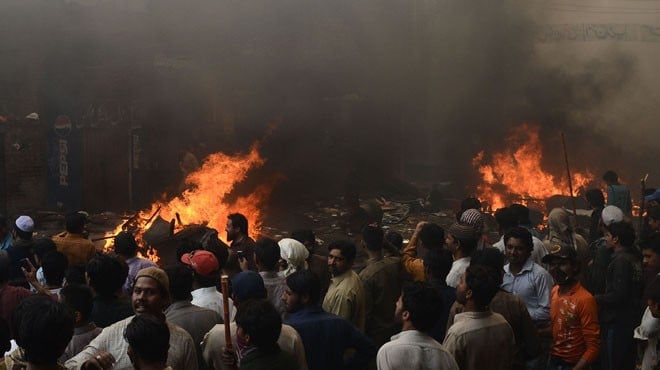

On March 15, 2014, hundreds of people attacked a temple and set it on fire in Larkana, Sindh, following rumours that a Hindu man had desecrated the Holy Quran.
The charged crowd, according to media reports, attempted to burn the 42-year old accused. But the police took timely action and rescued him from the angry crowd by disguising him in the police uniform.
But deranged Ghulam Abbas, accused of desecrating the Holy Quran on July 4, 2012 in Chanighot town of Bahawalpur district, was not that lucky. Local police took him into custody and put him in the lockup. As the news spread, announcements were made from the local mosques and within no time a frenzied mob of hundreds gathered outside the Chanighot police station. The police couldn’t stop the violent crowd from getting hold of the alleged blasphemer and dragging him to the main roundabout, dousing him in petrol and burning him alive.
The police registered a case against 1,500 to 2,000 people but none was brought to book.
Often, in such cases, levelling blasphemy accusations against a person involves common people and is hijacked by the local cleric. It takes no time to gather people, mainly uneducated ones from the lower-middle class. "But many educated people are also easy to infuriate, though they are not violence," says a Lahore-based senior police official who has handled many cases of blasphemy, including the Joseph Colony incident. "In fact, violence has become the easiest thing to justify in the name of religion."
In Pakistan, at least 38 people accused of blasphemy were killed between 1986 and 2012, according to data compiled by National Commission on Justice and Peace (NCJP), a Lahore-based NGO.
The first incident of a mob lynching a blasphemy accused happened in Gujranwala in 1994 when Mohammad Farooq, a local practitioner in traditional medicine, was accused of blasphemy by his neighbours. He was forcibly taken out from a police station by a crowd who tied him to a motorbike, dragged him on the roads, and stoned him to death. The state did not take notice of the incident.
This set a horrible precedent -- Gojra, Sangla Hill, and Badami Bagh are some examples.
Dr Khalid Masood, former chairman of Council of Islamic Ideology (CII), believes Muslims in Pakistan generally "feel threatened by the minorities. We have in mind that Muslims ruled the subcontinent for many centuries being a minority. So, these issues create insecurity among us against the minorities. In most cases of blasphemy, the crowd demonstrates that insecurity."
He says since Hinduism was inclusive so there was always a threat that Muslims in the subcontinent could assimilate into Hinduism.
Masood further says, "We adopted a shortcut and termed the new state Islamic before actually defining the role of non-Muslims. And we did not stop here. We went further and defined it on sectarian basis as a Hanafi state."
Consequently, this empowered the ulema and religious figures to define religion, including blasphemy-related issues. "The ulema know very well that they could not influence a majority of population on political basis. They started using pressure tactics like blasphemy issues to pull crowds and show their strength. They played a very important role in collecting mobs in blasphemy cases," he adds.
Masood ascribes this to "a serious dearth of religious literacy in Pakistan. Even educated lot of the country thinks that the cleric knows the religion well. So, a majority of people follow them blindly".
"Our national psyche of fear is also responsible for such abrupt responses on religious issues. It is being said that our country, our religion, and our sect is constantly under threat from foreign powers. We see a blasphemy accused as an agent of such forces. It is so easy to rationalise, externalise, and justify crowd violence over blasphemy issue. One knows that an individual can do anything in a crowd," Masood adds.
State response to brutalities of such crowds is dismal. Police and security agencies have hardly shown interest in bringing justice to those responsible for spreading violence in the name of blasphemy.
After the 2009 riots, the police in Gojra arrested dozens of suspects, yet no one was ever put on trial or imprisoned. In Lahore, police arrested 83 suspects following the Joseph colony incident but so far none has been convicted.
A senior police official in Lahore says that the major challenge for police is to rescue the accused and diffuse the crowd. "The police would never try to disperse such a crowd. Use of force against such charged crowds could mean real trouble while not acting against the crowd can only result in temporary suspension from service."
Police officials suspended following the Gojra incident in 2009 and Joseph Colony incident in 2013 have been restored to their jobs.
"It is very sad to say but, to be honest, if such an incident happens in future, the police will not use force against a mob gathered in the name of blasphemy or any other religious issue," he concludes.